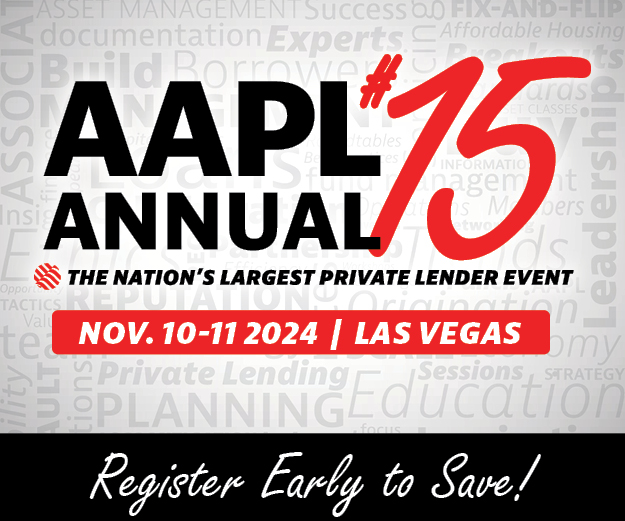More than a year after proposing an expansion to its definition of “accredited investor,” the Securities and Exchange Commission (SEC) has published its final ruling on the matter. This represents the first meaningful modification of the definition since its inception in 1982, when it was created in an effort to govern the sale of unregistered investments.
In its final rules, the SEC cited comments from the American Association of Private Lenders (AAPL) and its general counsel, Geraci LLP. Nearly all AAPL and Geraci’s recommendations made it into the newly modified accredited investor definition.
“Having our comments specifically cited by the SEC as part of their final ruling is a powerful step forward as we seek to grow our legislative advocacy initiatives,” said Linda Hyde, managing director of AAPL. “It’s rewarding to see that our efforts are heard, especially as we were the only private lender association cited. The amended definition will be a game-changer for the private lending industry by increasing the number of accredited investors.”
Under the modernized definition, rather than accredited investor status being determined solely by income or net worth considerations, individuals will attain accredited investor status if they meet any of the following:
- Maintain in good standing their Series 7, 82, or 65 licenses.
- Hold and maintain in good standing a specific, verifiable professional certification, designation, or credential as designated by the SEC via Commission Order.
- Are a “knowledgeable employee” of a private-fund issuer of securities as defined under Rule 3c-5(a)(4) of the Investment Company Act.
The ruling also expanded the definition to include certain entities:
- SEC- and state-registered investment advisers, and exempt reporting advisers under Section 203(m) or Section 203(l) of the Advisers act.
- Rural Business Investment Companies as defined under Section 384A of the Consolidated Farm and Rural Development Act.
- LLCs with at least $5 million in assets.
- Any entity owning “investments” in excess of $5 million, with “investments” being defined in Rule 2a51-1(b) of the Investment Company Act.
- Certain family offices as defined in the “family office rule” under 17 CFR § 275.202(a)(11)(G)-1 with at least $5 million in assets under management.
Finally, the ruling allows “spousal equivalents” as defined under 202(a)(11)(G)-1(d)(9) to pool finances to qualify as an accredited investor under the income/net worth rules.
The changes mark the SEC’s intention to include “knowledge and expertise” criteria. While unregistered investments — also called exempt offerings — pose significant financial risk, the SEC and its supporting commenters, including AAPL and Geraci, contend that the new individuals and entities allowed to invest under the new definition are financially sophisticated and able to make informed decisions.
“The ruling meets the SEC’s original mandate in creating the accredited investor definition,” said Kevin Kim, Partner and Department Head of Corporate and Securities at Geraci LLP. “The goal has always been to protect consumers against financial loss and liquidity issues should they invest in unregistered funds or ventures for which they are unable to properly evaluate the merits or risks. The modernized definition accounts for the existence of persons who, although they may not meet the income or net worth requirements, are professionally well-versed in evaluating these kinds of investments.”
The new ruling is especially significant to the private lending industry as it will increase the number of people and entities able to invest and the amount of capital available. Such investments include private companies, offerings by specific hedge funds, private equity funds, venture capital funds, and other opportunities within the industry.
The new ruling will also make the process of raising capital more efficient. Under Regulation D, issuers of exempt offerings must reasonably believe that their investors are accredited and, in the case of 506(c) investments, take steps to verify that status. Verifying licensure or professional certifications provides an additional and relatively straightforward way to make such assessments. Expanding the pool of possible investors also makes it easier to find investors, lowering search costs and increasing the cost effectiveness of advertising and solicitation efforts.
Finally, the modified definition will help increase the liquidity of securities issued in exempt offerings. Investors who seek to resell securities will find that their pool of qualified purchasers has grown.
“We are excited to have a critical voice in legislation and to be able to effectively advocate for our industry,” said Eddie Wilson, CEO and Chairman of AAPL. “We look forward to continuing and expanding on our efforts to support our constituents throughout the private lending industry.”
The ruling will become effective 60 days after it is published in the Federal Register.
About the Author: Kat Hungerford is executive editor of Private Lender magazine and project development manager at the American Association of Private Lenders, the oldest and largest association representing the private real estate and peer-to-peer lending industry. Hungerford also acts as secretary for the association’s Government Relations Committee, which serves as AAPL’s advocacy arm in state and federal legislatures.












Leave A Comment